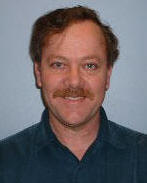 Philip
Broadbridge Tells it Like It is, Mathematically Speaking. (September 6,
2005)
Philip
Broadbridge Tells it Like It is, Mathematically Speaking. (September 6,
2005)
|
News & Views item - September 2005 |
![]()
 Philip
Broadbridge Tells it Like It is, Mathematically Speaking. (September 6,
2005)
Philip
Broadbridge Tells it Like It is, Mathematically Speaking. (September 6,
2005)
In 2001 Philip Broadbridge joined Australia's diaspora and accepted the post of head of the Department of Mathematical Sciences at the University of Delaware where he had responsibility for some forty academic staff.
The May 2004
edition of the Australian Mathematical Society Gazette
published an article by Professor Broadbridge entitles "Brain
Drain"![]() which it prefaced with, "There is growing concern about Australia’s brain drain.
The Gazette is running a series of personal essays by mathematicians who
went overseas. Philip Broadbridge is the second author in this series." The
article begins:
which it prefaced with, "There is growing concern about Australia’s brain drain.
The Gazette is running a series of personal essays by mathematicians who
went overseas. Philip Broadbridge is the second author in this series." The
article begins:
After two years in University of Delaware, I have been invited by the editors of the Gazette to recount my reasons for moving from Australia to USA, to compare Australian and U.S. institutions, and to contemplate what it would take to attract me back.
Professor Broadbridge then proceeded to give a forthright account of the problems besetting Australian academe from his viewpoint as an academic mathematician and an expatriate. He then concludes with the rhetorical question, "Would I come back?" And answers:
I am Australian and I do have close ties there. I would be influenced to return if there were signs that the country had bottomed out its anti-intellectual slide, and if the mathematics and science disciplines had regained some of their zeal and pride. This should be reflected in better funding for institutions of higher learning. I would be looking for a position that could use my management experience, with some opportunity for research and/or research management, and a salary approaching half a local median house price, located not too far from people that are dear to me. In the mean time, I am well treated and I am proud to be in a strong department at University of Delaware.
In fact Professor Broadbridge has just been lured back to Australia with the Directorship of the Australian Mathematical Sciences Institute (AMSI).
In an interview with The Age's Ian Porter he said that manufacturing and mathematics are two areas we need to stay in good health. "If the automotive industry is not healthy, our whole manufacturing base is not healthy," and went on to make the point that the importance of mathematics to a healthy industrial sector is not widely recognised in Australia and the industry uses wide ranging engineering skills based on materials science as well as logistics and simulations. "If we lose these engineers to overseas companies, we also lose our mathematical skills base, which is crucial to a number of key industries."
He told Porter that Australian universities are downgrading the importance of mathematics, especially when compared with the US.
In the US, students studying engineering -- chemical, electrical, civil -- all take various maths courses that take them within two units of a mathematics major. Most go on and do the two units. In Australia, some engineering students do one or two units early in their course and that's it.
Professor Broadbridge then expanded maths purview naming biotechnology, the social sciences, and electronic security as three sectors crucially dependent on competent mathematical analyses.
So why has he now returned to
Australia? According to Ian Porter, "He believes the influence of mathematics
will return to the levels of the 1960s, when dramatic advances were made in
space science, theoretical physics and scientific computing.
"He said the Federal Government had made a significant
commitment by establishing AMSI and two other centres of excellence."
Let's hope he's right.